Noor stands trembling within the chill afternoon mild of the courtyard, not from the chilly, however from concern.
Wearing her thick winter coat, she has come to make a criticism to the boys of Hayat Tahrir al-Sham (HTS), Syria’s new de-facto rulers, and the brand new legislation on the town.
She begins to cry as she explains that three days earlier, simply earlier than 9 within the night, armed males had arrived in a black van at her house in an upscale neighbourhood of the town of Latakia. Alongside along with her kids and her husband, a military officer, she was pressured out onto the road in her pyjamas. The chief of the armed males then moved his circle of relatives into her dwelling.
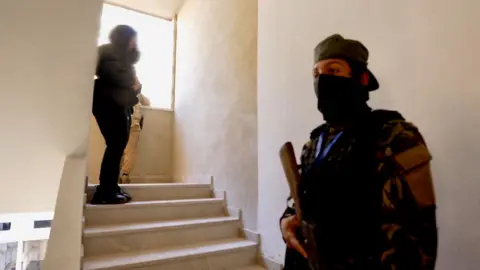 Darren Conway / BBC
Darren Conway / BBCNoor – not her actual identify – is Alawite, the minority sect from which the Assad household originates, and to which most of the former regime’s political and navy elite belonged. Alawites, whose sect is an offshoot of Shia Islam, make up round 10% of Syria’s inhabitants, which is majority Sunni. Latakia, on Syria’s north-west Mediterranean coast is their heartland.
As with different cities, an array of various insurgent teams have rushed into the ability vacuum left after Assad’s troopers deserted their posts. The regime had exploited sectarian divisions to take care of its grip on energy, now the Sunni Islamist HTS has pledged to respect all religions in Syria. However Latakia’s Alawite inhabitants is fearful.
Some individuals have not even left their houses for the reason that regime change as a result of they fear that there shall be a reckoning, and that they should pay a heavy worth for the help of the outdated regime.
Noor exhibits CCTV footage from her house, to 34-year-old Abu Ayoub, HTS normal safety commander. Within the movie, a gaggle of bearded fighters, some carrying baseball caps and others in navy fatigues, is pictured on her doorstep.
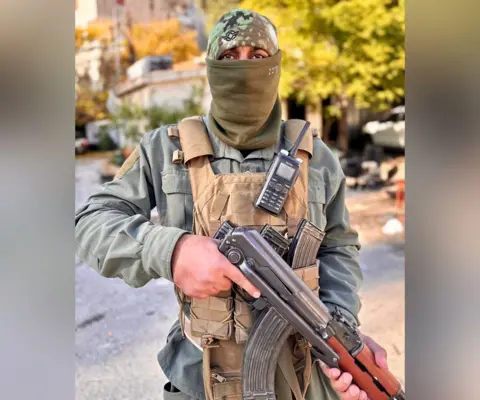 Quentin Sommerville / BBC
Quentin Sommerville / BBCThey don’t seem to be from HTS, she says, however one other group, rebels from the northern metropolis of Aleppo.
“They broke down the door. There have been 10 militants at our door and 16 others ready down the road with three automobiles,” Noor tells Abu Ayoub. His males are principally from Idlib and Aleppo, the place the HTS and allied insurgent factions have been based mostly earlier than launching the offensive that overthew Assad three weeks in the past. They stand round in fight fatigues, holding their rifles and listening intently as she describes how the household’s belongings have been thrown into the road.
HTS was as soon as aligned with al-Qaeda and continues to be proscribed as a terror organisation by most Western international locations, though the UK and US say they’ve been involved with the group. In a matter of weeks, it has gone from enemy of the state to the legislation of the land. Abu Ayoub and his males are adjusting to the change in roles from revolutionaries to policemen.
Noor is just one of an extended line of complainants who’ve come to their normal safety station with grievances. The bottom, the town’s former navy intelligence headquarters, was maybe probably the most feared place in Latakia. Now it’s a shambles, with damaged radios and gear scattered throughout the courtyard. Torn portraits of Bashar al-Assad lie within the grime.
A person joins the queue of these making complaints. He has a black eye, damaged ribs, and his shirt is torn and bloodied. He says males from Idlib had damaged into his house.
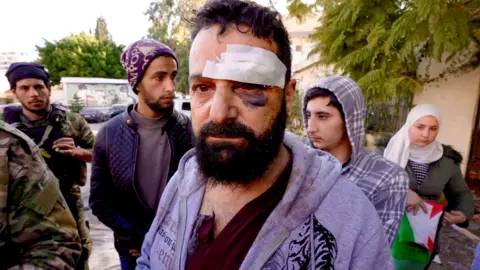 Darren Conway / BBC
Darren Conway / BBC“A few of them have been civilians, some wore navy garments and have been masked,” he says. “They hit my daughter and aimed weapons at my son’s head. They stole cash, they stole gold.”
Each call-out here’s a present of drive, particularly with so many armed teams within the metropolis. With the person’s son directing them, the HTS safety drive drives to one of many poorer neighbourhoods, weaving by way of a warren of again streets, previous scrapyards and middens.
The armed police take up positions alongside the road and on the doorway of the house. They carry two suspects again to the station for questioning.
However they barely have time to clear their weapons when there’s one other criticism, a dispute over fuel bottles that left one other man crushed.
He says three males had pulled weapons on him.
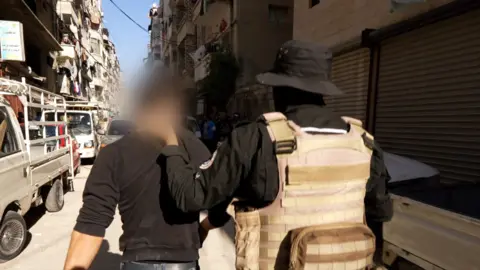 Darren Conway / BBC
Darren Conway / BBCOne other race within the automobiles to a crowded industrial and residential neighbourhood. When the police pull a suspect out into the road – his face nonetheless bloody from the sooner combat – native girls come to their balconies and shout “Shabiha! Shabiha!”. They’re accusing the suspect of being a member of the shadowy militia drive, principally made from Alawite males, who did the Assad regime’s soiled work.
Since its lightning-fast sweep to victory throughout Syria, Islamist HTS has pledged to maintain the peace and defend all the nation’s minorities. And day-after-day Abu Ayoub has to make good on that pledge.
“Some infiltrators into the revolution, some saboteurs, and a few weak-minded persons are making the most of the state of affairs within the areas that have been not too long ago liberated,” he says.
Abu Ayoub admits the state of affairs within the metropolis was “a bit chaotic” however turns his consideration to Noor. “We’re right here now, we weren’t right here when the military left. We have been initially in Damascus after which we got here. They’re thugs, and we’ll evict them from your home. We are going to return your belongings. You’ve gotten my phrase,” he stated. And with that he orders his males into their pickup vans and with sirens blaring they head for the house.
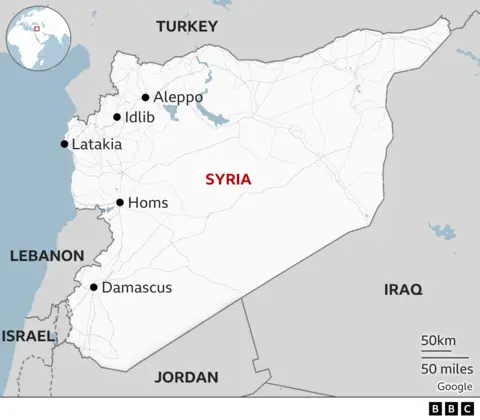
Latakia is a metropolis liberated. Final Friday, tens of 1000’s of individuals from all sects, gathered on the streets to have a good time the downfall of the Assad dynasty. In a metropolis sq., they sat atop the plinth the place the statue of Hafez al-Assad, Bashar’s father – who dominated for 29 years earlier than his loss of life in 2000 – as soon as stood, and joyfully waved the flag of a free Syria.
The message that day was unity, of 1 Syria, with out sectarian division. However after half a century of tyrannical rule from a regime which fanned sectarian hatred and warned that Alawites can be massacred in the event that they ever misplaced energy, it’s an adjustment to say the least.
On Saturday, three HTS fighters have been killed, and 14 injured exterior the town, in what it stated was gun battle with a felony gang. HTS, which is making an attempt to take care of calm, claims there was no sectarian ingredient to the assault.
On the way in which to Noor’s house, the HTS convoy velocity by way of the streets and passersby cheer them and flash the peace signal.
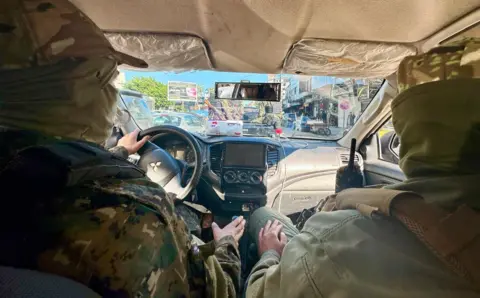 Quentin Sommerville / BBC
Quentin Sommerville / BBCThe brand new Syrian flag, with its inexperienced as an alternative of crimson stripe, and three crimson stars as an alternative of two inexperienced, is commonplace on store shutters and hanging from balconies. However in Alawite areas, individuals principally watch in silence because the convoy strikes alongside. There are fewer new flags in proof.
Azam al-Ali, 28, an HTS safety officer from Deir al-Bitter in japanese Syria sits within the entrance seat. After a lot oppression, he says, it would take time for individuals to belief authority once more.
“A lot of the oppressed that include complaints are from two sects, the Sunni and the Alawite. We don’t differentiate. However the excessive poverty that this regime left behind brought on this huge chaos,” he tells me because the site visitors components for the convoy.
And he notes that Alawites, a few of whom have been among the many poorest in Syria, suffered too beneath the Assad regime.
We arrive at Noor’s house and half a dozen armed HTS males hurry up the steps.
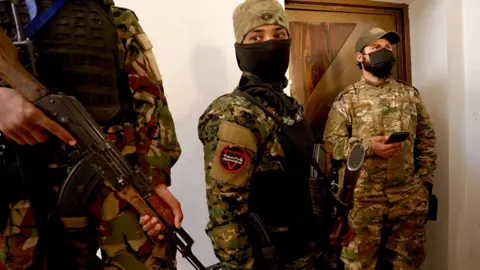 Darren Conway / BBC
Darren Conway / BBCThe girl behind the door refuses to open up, however after some negotiation the door opens, and he or she and her household are ordered to depart. Noor goes in to retrieve some garments and books for her daughter who’s finding out for exams. Weapons and ammunition belonging to the insurgent squatters are confiscated.
“Once I went to HTS at this time I used to be terrified,” says Noor. “Their look was so intimidating and horrifying. Actually, although, they have been very good.”
However she will not be returning to the house. One nightmare has led to Syria, and for Alawites, one other has begun, she says.
As she clutches her belongings, Noor says she not feels secure in her dwelling.
“It is inconceivable for me to dwell right here once more. I do have hope, however not within the close to future. In the mean time I do not dare.”
